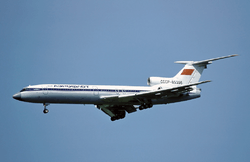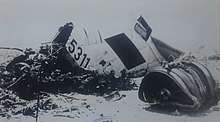Aeroflot Flight 7425
Aeroflot Flight 7425[nb 1] was a domestic scheduled Karshi–Ufa–Leningrad passenger flight that crashed near Uchkuduk, Uzbek SSR, Soviet Union on 10 July 1985. The crash killed all 200 occupants (148 adults, including 9 crewmembers, and 52 children) on board. Investigators determined that crew fatigue was a factor in the accident.[2]
 An Aeroflot Tupolev Tu-154B-2 similar to the accident aircraft | |
| Accident | |
|---|---|
| Date | 10 July 1985 |
| Summary | Pilot error and fatigue |
| Site | Uchkuduk, Uzbek SSR, Soviet Union 42°9′24″N 63°33′20″E |
| Aircraft | |
| Aircraft type | Tupolev Tu-154B-2 |
| Operator | Aeroflot |
| Registration | CCCP-85311 |
| Flight origin | Karshi Airport |
| Stopover | Ufa Airport |
| Destination | Pulkovo Airport |
| Occupants | 200 |
| Passengers | 191 |
| Crew | 9 |
| Fatalities | 200 |
| Survivors | 0 |
Passengers and Crew
Flight 7425 was serviced by a Tupolev Tu-154B-2, registration CCCP-85311. Led by pilot-in-command Oleg Pavlovich Belisov, the cockpit crew consisted of co-pilot Anatoly Timofeevich Pozyumsky, navigator Garry Nikolaevich Argeev, and flight engineer Abduvahit Sultanovich Mansurov. There were five flight attendants in the cabin.[3]
Accident
The aircraft was operating the first leg of the flight, and cruising at 11,600 metres (38,100 ft) with an airspeed of 400 kilometres per hour (250 mph), close to stalling speed for that altitude. The low speed caused vibrations, which the aircrew incorrectly assumed were engine surges. Using the thrust levers to reduce engine power to flight idle, the crew caused a further drop in airspeed to 290 km/h (180 mph). The aircraft stalled and entered a flat spin, crashing into the ground near Uchkuduk, Uzbekistan, at that time in the Soviet Union. There were no survivors.[2]

Flight 7425 remains the deadliest air disaster in Soviet and Uzbek aviation history, the deadliest in Aeroflot's history, and the deadliest accident involving a Tupolev Tu-154.[2]
Cause
Flight 7425's cockpit voice recorder was destroyed in the crash. Investigators, with the help of psychologists, studied the human factors that led to the incident. They found Flight 7425's flight crew were very fatigued at the time of the crash from having spent the prior 24 hours at the departure airport prior to takeoff. Another factor was inadequate regulations for crews encountering abnormal conditions.[4]
Notes
- A Russian source claims the flightnumber was ″5143″.[1]
References
- "Катастрофа Ту-154Б-2 Узбекского УГА в районе пос.Учкудук" [Accident Tu-154B-2 of the Uzbek UGA near the village Uchkuduk] (in Russian).
- Accident description at the Aviation Safety Network. Retrieved on 19 February 2015.
- "Катастрофа Ту-154Б-2 Узбекского УГА в районе пос.Учкудук (борт СССР-85311), 10 июля 1985 года. // AirDisaster.ru - авиационные происшествия, инциденты и авиакатастрофы в СССР и России - факты, история, статистика" [Accident Tu-154B-2 of the Uzbek UGA near the village of Uchkuduk (board USSR-85311), July 10, 1985. // AirDisaster.ru - aviation accidents, incidents and plane crashes in the USSR and Russia - facts, history, statistics]. www.airdisaster.ru (in Russian). Retrieved 30 March 2017.
- Gero, David (1996). Aviation Disasters Second Edition. Patrick Stephens Limited. p. 187.